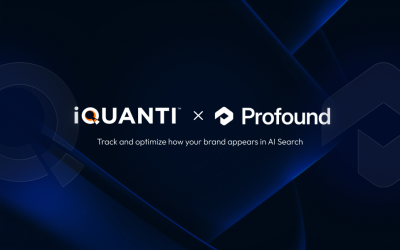“We’re in the age of big data. It’s interesting how the acknowledgement of data now even permeates into pop culture and the lexicon. People understand that they’re being tracked. People understand that data now is being gathered about them. And it’s up to us to mind that and deliver performance to marketers without being intrusive. That’s a lot of what we’re trying to do at iQuanti, and there’s some really interesting things in the market emerging around that.”
iQuanti’s Brent Trimble talks to WPEngine’s Andy North about the age of data, consumer privacy, personalization and staying ahead of the advertising curve.
Read transcription of the full-length interview (14.37s) here.
Welcome. This is Velocitize Talks. And I’m Andy North. I’m here today with Brent Trimble, SVP of Strategy and Solutions at iQuanti. Brent, thank you for being here.
Thank you for having me.
Tell us a little bit about iQuanti and about your background and where you are now and about some of the exciting things going on.
We’re an independent digital marketing firm founded in 2008, and we came out of the teeth of the Great Recession with really a fundamental grounding principle.
Could marketers use data in a more meaningful way to drive business results?
Our focus is primarily in performance channels such as display advertising, attribution and search engine marketing. Any client that has a need to acquire, convert or retain a tough customer and make the most out of his digital marketing spend is typically a good fit for us.
We’ve also developed and patented some really interesting proprietary technology to help marketers look forward and predict the efficacy of their digital marketing tactics. One of these tools is called ALPS. It helps clients test their search engine marketing models and see their efforts come to fruition on the search platform.
Myself, I’m very fortunate. In 1999 or 2000, I sort of fell into this thing called the internet. I went to several introductory meetup groups and taught myself how to code. I said, you know, this thing looks like it has legs.
I was with more of a generalist advertising firm that fortunately had a burgeoning digital marketing department. And from there, I’ve been able to have a really diverse and very rich career travelling the world and doing everything from starting practices with independent agencies, helping run practices on the holding company side and building the valuation of companies, one of which culminated in a sale to Accenture Digital. It’s been an exciting run.
You wrote a column in Campaign about the importance of data and how it should be the foundation of any marketing campaign or program. And yet you also mentioned that today’s data is more about quick-hit analytics. How do you corroborate the two? How do you get the two to work together?
This is the existential moment that digital agencies or services firms are having right now. And the pendulum swings back and forth between specificity and being very general. But early in the days of advertising, even in what we think of as the Mad Men era, data really had primacy. There were very well-established planning departments that empirically sourced data, studied consumers in panels and market-tested products. One example is the set-top box by Nielsen.
Indelible brands were formed in that period: Procter and Gamble and Unilever and things we grew up with like Tide detergent and Kool-Aid. Much of that was grounded in data.
The point of the article is that the agency model shifted away from that. The agencies really gave away that high ground of planning and strategy and focused very much on transactions. We’re going to make print ads, billboards, TV spots. All still very valuable and relevant today, but without the grounding principle of using data even as the internet burst on the scene and disrupted things. It’s very easy for a firm to adopt what we call more shallow metrics that are important, but don’t always tell the full story: things like clicks and views and impressions and so forth. And that’s really what the industry is struggling to reconcile.
What are your thoughts on some of the privacy legislation that’s pending in the U.S., much like in Europe with GDPR?
There’s always folks who are going to be sensitive about privacy, as they should be. But if data is used in a responsible way, there can be a really safe, trustworthy transaction between a brand and an individual. The use of that data and that transaction has to have some value to the consumer. With online retailing being so prevalent and everything being transacted digitally, most consumers now make a subconscious acknowledgement that someone is using data to make their experience better. You know, going onto a favorite website or your airline booking platform of choice. And hey, welcome back. We recognize you, that type of thing.
It would seem there’s a fine line between personalization and perhaps Big Brother.
Absolutely. With some interesting technology coming out to make transactions between the brand and the consumer a bit more trustworthy. And you see some beginnings of that with things like addressable TV or even subscription-based TV. We know there’s maybe a message that’s going to be served to us. There’s acknowledgement that there’s data about us as a subscriber, but we’re making a transaction that we’re comfortable with.
Let’s go back to your article in Campaign. You mentioned the three Cs in choosing an agency of the future: consequential, chemistry and case study. Can you talk a little bit about those and what they mean going forward?
Sure. Some in our industry are speaking about broad marketing services. There is just a tremendous upheaval. Much of it good, some of it kind of negative, if a firm is not able to adapt to the reality on the ground.
Most marketers in the era we live in are quarterly focused and very oriented towards profits and returns. They’re looking for firms with some specificity in either their line of business or their vertical, and certainly with their products and the channels on which they want to embark. So iQuanti, for instance, has a deep heritage in banking and financial services. When we go to a potential partner or client, we have a very deep case study in BFS. Most firms we see gravitating towards some type of specialization or some type of real deep expertise.
When we talk about consequential, we’re talking about being a true business partner, not just a channel manager. What does the data really mean here, looking at deep business metrics around market share? We’re interested in calculating the total lifetime value of a customer by modeling the total customer experience.
There’s plenty of transactional expertise that’s available in the market, but firms that are wed to their client as a partner across the entire customer journey are the ones that are thriving in this new era.
On to the third point I raised: chemistry. Does the team have chemistry? Are they well aligned culturally and are they a good fit? All those things still really matter.
Much of that is borne from your being consequential and your being able to offer good case studies. Do the services and the expertise align? Are there real shared goals and values and objectives? Is the firm able to make the client’s business objectives their own? In the context of the services industry, those are some key attributes to look at.
That is interesting. What are some of the future trends or technologies that you see occurring, particularly in the spaces where you work with your clients?
We look at a few different quadrants: the present and then what’s coming in both the mid- and the longer term. What our clients are interested in and we’re excited about are things that will change the entire advertising ecosystem.
Compared to the old model of impressions and eyeballs, targeting has become more precise and channels have become more disparate. We’re seeing consolidation around the three titans in the industry: Facebook, Google and now Amazon. But advertising is still making educated guesses that are becoming much more sophisticated around reach and tonnage and eyeballs.
If a technology comes into the equation that has enough ubiquity to cut out the middleman, that could be very consequential. And there’s some real-life examples, such as blockchain and integrated ledger technology. Instead of you being pixeled by a brand and then chased around the internet, what if you opted in to a platform and acknowledged that you were you? You’d then have a very 1-to-1 relationship and receive marketing messages at acceptable intervals.
An example of how this might look is the Hulu ad model, where every 20 minutes or so you’re interrupted, but it’s not super intrusive. The ads are usually within your sphere of interest.
Imagine, as well, if a currency was deposited in your account in exchange for your attention. Suddenly we’ve disrupted that whole ecosystem of massive advertisers. I think that really bears watching in the near-term, where we’re counselling a lot of clients on how they can be found by consumers.
IQuanti is really focused on data, which has a bias toward performance channels because that’s where you can you can gather a lot of transactional data. And being found doesn’t necessarily have to mean a consumer is going to a web browser on their laptop and typing in a search query on Google. Today, brands are found by people speaking into their mobile device or speaking into their car’s infotainment system. The rise of in-home devices is also something we’re watching. And if you use good SEO principles, create content that meets the user at their point of inquiry and utilize technology to the best of your ability, you will be found on all of these devices.
We’re doing a lot of work in that area right now around where the future of search is going. That’s a big push for our firm.
Now for the hardest question. Are there any books or podcasts that you’d like to recommend?
Back to the article in Campaign on how we’re all trying to adapt, a gentleman by the name of Michael Farmer wrote Madison Avenue Manslaughter. He’s a really interesting guy with a Harvard background who has seen sort of the rise and fall of the generalist advertising marketing model and has come up with a few hypotheses: how to shift and how to really transform and adapt. He addresses everything from the talent gap in a generalist firm all the way through to how to model. It’s a really good book that I’ve recommended to clients as well as colleagues in the space. And it’s kind of an apocalyptic tale of doom. But, you know, in the end, everything might turn out OK if we if we follow Michael’s advice. It’s an interesting book.
As featured on Velocitize.





